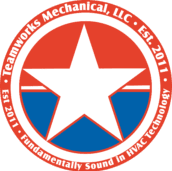Boiler Components & Parts: A Crucial Look into the Heart of Industrial Efficiency
Boilers have been the backbone of industrial processes for centuries, providing the essential energy required to power various applications across a multitude of sectors.
From powering steam engines during the Industrial Revolution to generating electricity in modern power plants, boilers play a pivotal role in our technological advancement. But what exactly are the key components and parts that make up these workhorses of industry?
What Parts are in a Boiler?
In this blog post, Teamworks Mechanical takes a closer look at the fundamental boiler components that work harmoniously to ensure efficient heat generation and energy production.
Furnace
At the core of every boiler lies the furnace, the primary combustion chamber where the fuel is burned to produce heat. Depending on the type of boiler, the fuel can be coal, natural gas, oil, or biomass. The furnace is designed to optimize the combustion process, ensuring efficient fuel utilization and minimizing harmful emissions. Proper furnace design is critical to achieving optimal heat transfer to the boiler's water or steam.
Water Walls
Water walls, also known as evaporator tubes or boiler tubes, are responsible for absorbing heat generated in the furnace and transferring it to the water. These tubes form the walls of the boiler's combustion chamber and are subjected to high temperatures and pressure. To withstand these harsh conditions, they are often made from high-quality alloy steel or other heat-resistant materials.
Steam Drum
The steam drum is a crucial part of water-tube boilers, acting as a reservoir for water and steam separation. As water circulates through the water walls and absorbs heat, it turns into steam. The steam and water mixture is then separated in the steam drum, with steam being drawn out for various applications, while water is recirculated back to the water walls for further heating.
Superheater
The superheater is a component found in many modern boilers that further enhances the energy efficiency of the system. Its primary function is to raise the temperature of the steam generated in the steam drum to a higher level, known as superheated steam. This superheated steam has increased energy content and is ideal for specific industrial processes or turbine applications.
Economizer
Boilers can be energy-intensive systems, consuming substantial amounts of fuel. An economizer is a heat exchanger that preheats the boiler's feedwater using the waste heat from the flue gases. By doing so, it increases the overall boiler efficiency by reducing the amount of fuel required to reach the desired operating temperature.
Air Preheater
An air preheater is another heat exchanger used in some boiler systems. It preheats the combustion air using the heat from the flue gases before entering the furnace. Like the economizer, this reduces fuel consumption and enhances boiler efficiency.
Burners
Burners are responsible for introducing and mixing the fuel with the combustion air in the furnace. They play a vital role in ensuring proper combustion and efficient fuel utilization. Burners can vary in design, ranging from simple mechanical systems to advanced technologies like low-NOx burners, which help reduce nitrogen oxide emissions.
Safety Valves
Safety is of utmost importance in boiler operations. Safety valves are critical components that release excess pressure to prevent boiler explosions. They are designed to open automatically when the internal pressure exceeds the predetermined safe limit.
Control System
A modern boiler control system is responsible for managing and regulating various boiler parameters, such as water level, pressure, and fuel flow. Advanced control systems utilize sensors and feedback loops to optimize boiler performance and ensure safe and efficient operation.
In conclusion, boilers are complex machines composed of numerous interconnected components and parts, each playing a vital role in achieving efficient and reliable heat generation. Understanding these fundamental boiler components is essential for engineers, operators, and anyone interested in the industrial processes powered by these indispensable workhorses. With ongoing advancements in technology, boilers continue to evolve, driving innovation and improving energy efficiency across industries.




















